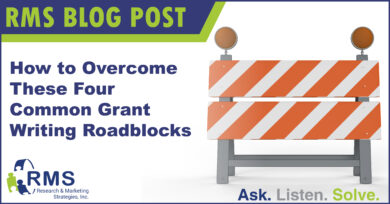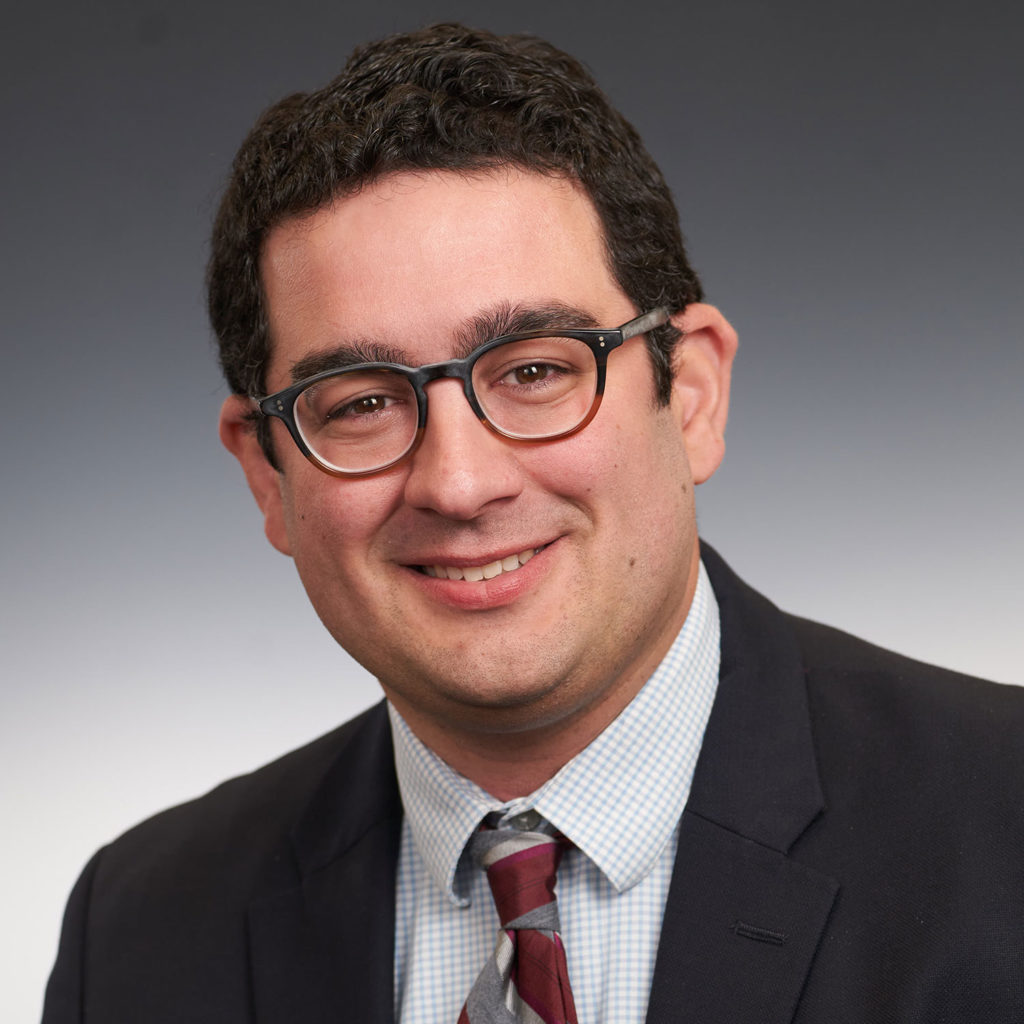How to Overcome These Four Common Grant Writing Roadblocks

Article by Patrick Fiorenza, RMS Director of Research Analytics –
This post will briefly focus on overcoming common roadblocks when working on a grant proposal. The most important takeaway is that much of the grant-writing work comes before you start writing. Keeping templates, data, and all the necessary information for a submission at hand is a huge time-saver. By following some of these suggestions, I hope your next grant-writing experience will run smoother and lead to a funded submission.
Roadblock #1: I can never find the words
- Solution: Keep a standard template to work from; tailor it towards each proposal
- Solution: Gather your team to talk and brainstorm
- Solution: Take a break
Even the most seasoned grant writer can suffer from writer’s block. After years of experience, many of us can feel writers block coming on and know ways to help overcome it. But when you’re working as part of a team with many different styles, working collectively can be difficult. With the added pressure of aggressive deadlines and not wanting to let your team down, writers block can be hard to overcome.
The three solutions here should help. Having a standard template to work from for all grant proposals is an immense time saver. Frankly, if you don’t have one of these, take your last 5 grant applications and make one; it saves so much time and effort! With a standard template, everyone starts at the same spot. Done well, you can tailor your messaging to the needs of the funder.
If you are stuck as a team, do some brainstorming. Not everyone is going to write at the same speed. Remember, the grant-writing process is just as important as the end product. Why? You’re creating systems and procedures to help with the next initiative.
Finally, just take a break. I can remember so many times working late or obsessing over word choices that the time spent on the work becomes counterproductive. Get some fresh air, get away from your desk, exercise, do something to reset and return to the work later.
#2: This grant is very complicated and overwhelming
- Solution: Look for a scoring rubric to help identify where to prioritize
- Solution: Make sure to ask your questions to funder for clarity
- Solution: Leverage previous experience and organizational knowledge
Many RFPS and grant applications are very complicated and it’s totally normal to feel overwhelmed in the beginning stages. Anyone working on a grant application has been there. For some applications, it has taken me weeks to just sift through all the requirements from the funder. In such instances, I have found it useful to start by looking for a scoring rubric. This should give you a very strong indication of what the funder finds valuable. Knowing how each part of the grant will be scored can help you set up your outline, framework, and workplan to complete the grant proposal. If a scoring rubric (or something similar) is not available, make sure it’s a question you ask during the Q&A. If you’re looking to score some bonus points, keep a log of questions as you review the scoring rubric and the grant application. This will prepare you so you’re ready to ask specific questions to the funder for clarity. Finally, make sure to reach out to your network, leverage previous experience, and/or connect with a colleague. Do your homework and some fact-finding, which might end up giving you an edge.
#3: I am worried we are going to put in all this effort just to lose
- Solution: Identify who has been awarded previous funding (if available)
- Solution: Triple-check eligibility requirements
- Solution: Develop an organizational matrix to help you make the decision
Deciding whether to answer “yes” or “no” to a proposal is very difficult. Frankly, sometimes the best response is “no.” Depending on the funder, you may be able to see who has been granted funding in the past. If there is only one award, and the same agency has held the contract for the past three cycles, or has multiple active awards, these are clues you may want to pass on that particular grant. I also suggest creating a matrix to identify what factors are important to your organization. At a minimum, make sure that you triple-check all qualifications.
Ask some key questions to determine if this grant is for you. What are the required credentials of staff to manage the project? What kinds of organizations will they fund? What are the MWBE requirements? How much can you subcontract? All of these are important questions to consider up-front to know if you are even eligible or will be competitive with your grant application.
#4: Our objectives and indicators don’t align with the grant priorities
- Solution: Tell your story of how indicators aren’t identical, but contain a common mission and purpose
- Solution: Describe your current data infrastructure and explain a plan to modify as needed
- Solution: Share your programs’ existing logic model
Generally, people don’t like roadblocks, but this is one area that I enjoy working through with clients. Just because the indicators do not line up, is not a reason to say “no.” Step one might be to see if you can tell a common story with the funder; talk about how your organization measures impact and how you are aligned with a common purpose or goal as the funder. As you do this, be very clear on your data infrastructure and how you evaluate your program(s). If a funder can see that you have very strong research and evaluation capabilities, there may be some leeway on the indicators. Be clear to say that you will work directly with the funder to assure priorities align. How can you do this? Talk about your program’s logic model. (A logic model is the visual representation of your program.) In the evaluation world, it’s the crux of how you show impact. For evaluators, it helps connect all the dots and is a support measurement of not just impact, but also implementation (i.e., the program as designed verse the program as implemented).
Once you identify a grant and you’re ready to go, important project management skills come into play. Make sure that, from the onset, you are committed to transparency and working collaboratively, that everyone is held accountable through clear expectations, and that the group relies on everyone’s strengths. By taking these steps and tailoring them towards your organization’s context and culture, I am confident that your next grant-writing projects will be more efficient, effective, and lead to more winning proposals.
Relational RMS Blogs:
Recruiting the Right Participants for Your Focus Groups: Best Practices
The Key to a Successful Program Evaluation: Developing Your Logic Model – Part 1 of 2
The Key to a Successful Program Evaluation: Developing Your Logic Model – Part 2 of 2
About the Author – Patrick Fiorenza

Patrick brings years of market research experience to the RMS Research Analytics team. His preliminary focus encompasses designing, implementing, gathering, and analyzing results from proven research methods created to obtain credible data to help guide decision-making across a variety of industries.
It’s good to know. We’re here for you.
Call us today, to see how we can help your organization.
Interested in conducting a market research project with RMS?
Contact our Vice President of Corporate Development, Sandy Baker at [email protected] or call 1-866-567-5422.
About RMS
Research & Marketing Strategies, Inc. (RMS) is a full-service market research firm in Central New York. Formed in 2002, RMS helps organizations that are looking to know more about their customers and/or potential customers. They conduct surveys, focus groups, mystery shopping, studies and analysis. Each project is customized and gets personal attention by the best in the business. RMS has a reputation for getting results and offers an independent means to conduct telephone, on-line and mail surveying, In-depth interviews, intercept interviews, and participant recruitment as well as focus group hosting through QualiSight, its onsite call center and focus group facility. Taking advantage of the region’s reputation for being a great market study barometer, RMS recruits and moderates for focus groups, community forums and town meetings.